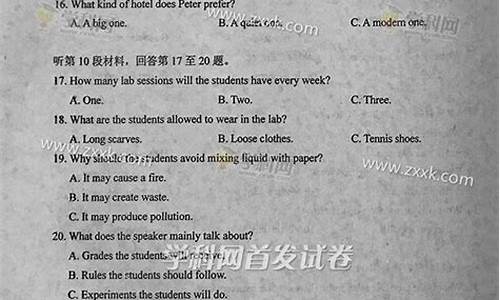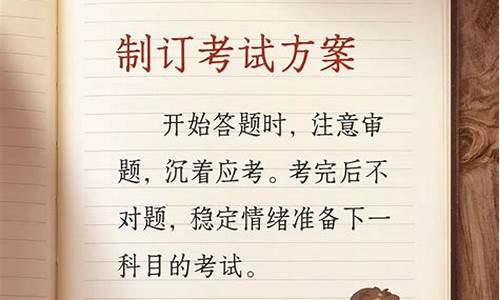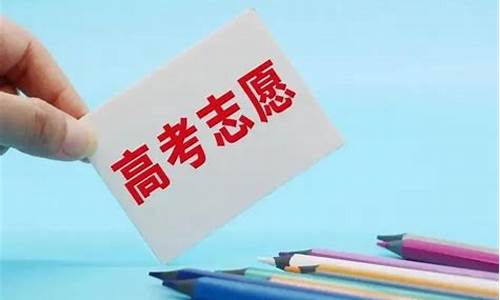您现在的位置是: 首页 > 教育分析 教育分析
海南2017高考英语答案,海南2017高考英语答案详解
tamoadmin 2024-05-25 人已围观
简介1.英语周报高三课标第五期答案I work with Volunteers for Wildlife, a rescue and education organization at Bailey Arboretum in LocustValley. Trying to help injured, displaced or sick creatures can be heartbreaking; s
1.英语周报高三课标第五期答案

I work with Volunteers for Wildlife, a rescue and education organization at Bailey Arboretum in LocustValley. Trying to help injured, displaced or sick creatures can be heartbreaking; survival is never certain. However, when it works, it is simply beautiful.
我在“野生动物志愿者”组织工作,这是蝗虫谷贝利植物园的一个援救教育组织,帮助受伤、流离失所或生病的动物。这样的工作可能会令人心碎;因为无法确定动物是否能活下来。然而,当救援起作用时,这种感觉真的很棒!
I got a rescue call from a woman in Muttontown. She had found a young owl on the ground. When I arrived, I saw a 2-to 3-week-old owl. It had already been placed in a carrier for safety.
我接到马特顿镇一位女士的求救电话,她在地上发现了一只猫头鹰幼鸟。当我到达时,我看见了一只两三周大的猫头鹰。为了安全起见,它已经被放在一辆大货车上。
I examined the chick and it seemed fine. If I could locate the nest, I might have been able to put it back, but no luck. My next work was to construct a nest and anchor it in a tree.
我检查了这只幼鸟,看起来还不错。如果我能找到鸟巢,我也许能把它放回去,但没那么幸运。接下来的工作就是建造一只鸟巢,并固定在一棵树上。
The homeowner was very helpful. A wire basket was found. I put some pine branches into the basket to make this nest safe and comfortable. I placed the chick in the nest, and it quickly calmed down.
房主非常乐于助人,给我找来了一只铁丝篮。为了让鸟巢安全舒适,我把一些松枝放进铁丝篮里,然后我把小猫头鹰放进鸟巢里,它很快安静了下来。
Now all that was needed were the parents, but they were absent. I gave the homeowner a recording of the hunger screams of owl chicks. These advertise the presence of chicks to adults; they might also encourage our chick to start calling as well. I gave the owner as much information as possible and headed home to see what news the night might bring.
现在最需要的是这只小猫头鹰的父母,但它们不在。我给了房主一份小猫头鹰饥饿尖叫声的录音。这些录音会让猫头鹰父母知道小猫头鹰的存在,也会鼓励小猫头鹰学着尖叫。我把尽可能多的消息告诉了房主,然后回家,看看晚上会有什么情况。
A nervous night to be sure, but sometimes the spirits of nature smile on us all! The homeowner called to say that the parents had responded to the recordings. I drove over and saw the chick in the nest looking healthy and active. And it was accompanied in the nest by the greatest sight of all — LUNCH!The parents had done their duty and would probably continue to do so.
这的确是一个紧张的夜晚,但有时大自然的神灵会眷顾我们!房主打电话说小猫头鹰的父母已经对这些录音做出了回应。我开车过去,鸟巢里的小猫头鹰看起来健康又活泼。鸟巢里出现了最令人感动的一幕——小猫头鹰的身边全是午餐!它的父母已经在尽职尽责,而且很可能会继续这样做。
英语周报高三课标第五期答案
许多在眼前看来天大的事,都不是人生一战,而只是人生一站。确实高考备战让你们很辛苦,可是已经坚持了这么久,这就已经是胜利。祝高考成功!下面是我为大家推荐的河北英语高考题2017年,仅供大家参考!
河北英语高考题2017年第I卷
注意事项:
1.答第I卷前,考生务必将自己的姓名、准考证号填写在答题卡上
2.选出每小题答案后,用2B铅笔把答题卡上对应题目的答案标号涂黑。如需改动,用橡皮擦干净后,再选涂其他答案标号。不能答在本试卷上,否则无效
第一部分听力(共两节,满分30分)
做题时,先将答案标在试卷上,录音内容结束后,你将有两分钟的时间将试卷上的答案转涂到答题卡上
第一节(共5小题;每小题1.5分,满分7.5分)
听下面5段对话。每段对话后有一个小题,从题中所给的A、B、C三个选项中选出最佳选项,并标在试卷的相应位置。听完每段对话后,你都有10秒钟的时间来回答有关小题和阅读下一小题题。每段对话仅读一遍。
例:How much is the shirt?
A.£19.15. B.£9.18. C.£9.15.
答案是C。
1. Where is Mary?
A. In the classroom. B. In the library. C. On the playground.
2. How much should the man pay for the tickets?
A. $16. B. $12. C. $6
3. Why can?t the woman give the man some help?
A. She is quite busy now.
B. She doesn?t like grammar.
C. She is poor in grammar,too.
4. What happened to Marx?
A. He lost his way.
B. He found his bike missing.
C. He lost his wallet.
5. Why did the man fail to attend the party?
A. He forgot it.
B. He didn?t know about the party.
C. He wasn?t invited to the party.
第二节(共15小题;每小题1.5分,满分22.5分)
听下面5段对话或独白。每段对话或独白后有几个小题,从题中所给的A、B、C三个选项中选出最佳选项,并标在试卷的相应位置。听每段对话或独白前,你将有时间阅读各个小题,每小题5秒钟;听完后,各小题将给出5秒钟的作答时间。每段对话或独白读两遍。
听第6段材料,回答第6、7题。
6. Why must the man drive to work?
A. It is the quickest way.
B. He has to use his car after work.
C. He lives too far from the subway.
7. What?s the relationship between the speakers?
A. Boss and employee.
B. Grandmother and grandson.
C. Teacher and student.
听第7段材料,回答第8~9题。
8. When is Alice?s birthday?
A. Tomorrow. B. The day after tomorrow. C. Today.
9. What will the two speakers buy for Alice?
A. A recorder. B. Some flowers. C. A box of chocolates.
听第8段材料,回答第10~12题。
10. What does the woman do in the group?
A. Play the piano. B. Play the violin. C. Sing for the group.
11. Who is Miss Pearson?
A. Leader of the group.B. Director of the group. C. Teacher of the group.
12. How often does the group meet?
A. Once a week. B. Twice a week. C. Every third week.
听第9段材料,回答第13~16题。
13. Who possibly is the woman?
A. An air hostess. B. A native Indian. C. A travel agent.
14. How long does the trip last?
A. Seven days. B. Eight days. C. Nine days.
15. What will the man probably do at the second stage?
A. Do some shopping. B. Visit the Taj Mabal. C. See wild animals.
16. What will the speakers do next?
A. Say goodbye to each other.B. Find out the price. C. Go to India by air.
听第10段材料,回答第17~20题。
17. In what way does Jack like to travel?
A. With a lot of people.
B. With one or two good friends.
C. All by himself.
18. What does Helen prefer on holiday?
A. Staying at home.
B. Seeing famous places.
C. Enjoying nature quietly.
19. What does Bob like the best about travel?
A. Making more friends. B. Buying what he wants. C. Seeing and learning.
20. Who prefers to do shopping while traveling?
A. Jack. B. Helen. C. Bob.
第二部分阅读理解(共两节,满分40分)
第一节(共15小题;每小题2分,满分30分)
阅读下列短文,从每题所给的四个选项(A、B、C和D)中,选出最佳选项,并在答题卡上将该项涂黑。
A
We have designed all our bank cards to make your life easier.
Using your NatWest Service Card
As a Switch card, it lets you pay for all sorts of goods and services, whenever you see the Switch logo. The money comes straight out of your account, so you can spend as much as you like as long as you have enough money (or an agreed overdraft (透支) to cover it). It is also a cheque guarantee card for up to the amount shown on the card. And it gives you free access to your money from over 31,000 cash machines across the UK.
Using your NatWest Cash Card
You can use your Cash Card as a Solo card to pay for goods and services wherever you see the Solo logo. It can also give you access to your account and your cash from over 31,000 cash machines nationwide. You can spend or withdraw what you have in your account, or as much as your agreed overdraft limit.
Using your cards abroad
You can also use your Service Card and Cash Card when you?re abroad. You can withdraw cash at cash machines and pay for goods and services wherever you see the Cirrus or Maestro logo displayed.
We take a commission charge (手续费) of 2.25% of each cash withdrawal you make (up to£4) and a commission charge of 75 pence every time you use Maestro to pay for goods or services. We also apply a foreign-exchange transaction fee of 2.65%.
Using your NatWest Credit Card
With your credit card you can do the following:
* Pay for goods and services and enjoy up to 56 days? interest-free credit.
* Pay in over 24 million shops worldwide that display the MasterCard or Visa logos.
* Collect one AIR MILE for every£20 of spending that appears on your statement (结算单). (This does not include foreign currency or traveler?s cheques bought, interest and other charges.)
21. If you carry the Service Card or the Cash Card, ________.
A. you can use it to guarantee things as you wish
B. you can draw your money from cash machines conveniently
C. you can spend as much money as you like without a limit
D. you have to pay some extra money when you pay for services in the UK
22. If you withdraw£200 from a cash machine abroad, you will be charged ________.
A. £4 B. £4.5 C. £5.25 D. £5.3
23. Which of the following is TRUE about using your NatWest Credit Card?
A. You have to pay back with interest within 56 days.
B. You can use the card in any shop across the world.
C. You will be charged some interest beyond two months.
D. You will gain one air mile if you spend £20 on traveller?s cheques.
24. The purpose of the passage is to show you how to ________.
A. pay for goods with your cards B. use your cards abroad
C. draw cash with your cards D. play your cards right
B
Once when I was facing a decision that involved high risk, I went to a friend. He looked at me for a moment, and then wrote a sentence containing the best advice I?ve ever had: Be bold and brave ? and mighty (强大的) forces will come to your aid.
Those words made me see clearly that when I had fallen short in the past, it was seldom because I had tried and failed. It was usually because I had let fear of failure stop me from trying at all. On the other hand, whenever I had plunged into deep water, forced by courage or circumstance, I had always been able to swim until I got my feet on the ground again.
Boldness means a decision to bite off more than you can eat. And there is nothing mysterious about the mighty forces. They are potential powers we possess: energy, skill, sound judgment, creative ideas ? even physical strength greater than most of us realize.
Admittedly, those mighty forces are spiritual ones. But they are more important than physical ones. A college classmate of mine, Tim, was an excellent football player, even though he weighed much less than the average player. ?In one game I suddenly found myself confronting a huge player, who had nothing but me between him and our goal line,? said Tim. ?I was so frightened that I closed my eyes and desperately threw myself at that guy like a bullet ? and stopped him cold.?
Boldness ? a willingness to extend yourself to the extreme?is not one that can be acquired overnight. But it can be taught to children and developed in adults. Confidence builds up. Surely, there will be setbacks (挫折) and disappointments in life; boldness in itself is no guarantee of success. But the person who tries to do something and fails is a lot better off than the person who tries to do nothing and succeeds.
So, always try to live a little bit beyond your abilities?and you?ll find your abilities are greater than you ever dreamed.
25. Why was the author sometimes unable to reach his goal in the past?
A. He faced huge risks. B. He lacked mighty forces.
C. Fear prevented him from trying. D. Failure blocked his way to success.
26. What is the implied meaning of the underlined part?
A. Swallow more than you can digest. B. Act slightly above your abilities.
C. Develop more mysterious powers. D. Learn to make creative decisions.
27. What can be learned from Paragraph 5?
A. Confidence grows more rapidly in adults. B. Trying without success is meaningless.
C. Repeated failure creates a better life. D. Boldness can be gained little by little.
C
The wallet is heading for extinction. As a day-to-day essential, it will die off with the generation who read print newspapers. The kind of shopping-where you hand over notes and count out change in return?now happens only in the most minor of our retail encounters,like buying a bar of chocolate or a pint of milk from a corner shop. At the shops where you spend any real money, that money is increasingly abstracted. And this is more and more true, the higher up the scale you go. At the most cutting-edge retail stores?Victoria Beckham on Dover Street, for instance?you don't go and stand at any kind of cash register when you decide to pay. The staff are equipped with iPads to take your payment while you relax on a sofa.
Which is nothing more or less than excellent service, if you have the money. But across society, the abstraction(抽象) of the idea of cash makes me uneasy. Maybe I'm just old-fashioned. But earning money isn't quick or easy for most of us. Isn't it a bit incredible that spending it should happen in half a blink(眨眼)of an eye? Doesn't a wallet?that time-honoured Friday-night feeling of pleasing, promising fatness?represent something that matters?
But I'll leave the economics to the experts. What bothers me about the death of the wallet is the change it represents in our physical environment. Everything about the look and feel of a wallet?the way the fastenings and materials wear and tear and loosen with age, the plastic and paper and gold and silver, and handwritten phone numbers and printed cinema tickets?is the very opposite of what our world is becoming. The opposite of a wallet is a smartphone or an iPad. The rounded edges, cool glass, smooth and unknowable as pebble(鹅卵石). Instead of digging through pieces of paper and peering into corners, we move our fingers left and right. No more counting out coins. Show your wallet, if you still have one. It may not be here much longer.
28. What is happening to the wallet?
A. It is disappearing. B. It is being fattened.
C. It is becoming costly. D. It is changing in style.
29. What makes the author feel uncomfortable nowadays?
A. Saving money is becoming a thing of the past.
B. The pleasing Friday-night feeling is fading.
C. Earning money is getting more difficult.
D. Spending money is so fast and easy.
30. Why does the author choose to write about what's happening to the wallet?
A. It represents a change in the modern world.
B. It has something to do with everybody's life.
C. It marks the end of a time-honoured tradition.
D. It is the concern of contemporary economists.
31. What can we infer from the passage about the author?
A. He is resistant to social changes.
B. He is against technological progress.
C. He feels reluctant to part with the traditional wallet.
D. He feels insecure in the ever-changing modern world.
2016-2017英语周报高三课标第五期答案
Book 2 Units 4-5
参考答案及部分解析
参考答案
1-5 BBCAC 6-10BCABB
11-15 ACBCB 16-20ACBBA
21-25 CBBDC 26-30CDACD
31-35 CCBAC 36-40BAECG
41-45 CADAB 46-50CBBAD
51-55 DCBBA 56-60ADBCC
61. It 62.the
63. untidy 64.keeps
65. fairly 66.up
67. to stop 68. that
69. of 70.where
短文改错:
71. Behind me being ... being → was
72. ... and obvious hadn't ...
obvious → obviously
73. The other stood ... other → others
74. ... notice him after ... after → until
75. ... rolled his eyes. his → her
76. ... when I turned back ... when → that
77. ... had been happened. 去掉been
78. Looking for him ... for → at
79. ... “Have nice day.” nice前加a
80. ... look happy. look → looking
One possible version:
Notice
In order to help foreign students learnmore about Chinese culture, two optional courses are to be offered in ourschool. The courses will be open to any student who is interested in them.
If you want to experience the beauty ofChinese language, the appreciation of poetry is the right course. It focuses onintroducing the characteristics of the poetry of Tang and Song dynasties andappreciating their beauty. The paper-cutting course is designed for those wholove using their hands. By taking the course, you will not only learn how tomake different types of paper-cutting but get familiar with its connection toChinese culture.
For more information, please contact theDean's office.
部分解析
阅读理解:
A篇(日常活动)
本文是记叙文。雪地中的散步令作者感到心情舒畅。
21. C。词义猜测题。由上文的I've planned to attend an emergent webinar及下文的I don't have time for this可知,作者“不情愿地(reluctantly)”穿上靴子准备遛狗。故C项正确。
22. B。推理判断题。由第三段中的I walk slowly with heavy steps, worrying about my to-do list, and Idon't notice the world around me可推断,刚开始散步时,作者感到紧张不安。
23. B。细节理解题。由第五段开头的Once again, my animal teacher is reminding me to enjoy the presentmoment可知,Rio“教育”作者要活在当下。
24. D。标题归纳题。由最后一段When we walk home, I smile broadly, spirit washed clean, ready forwhatever the day may bring可知,忙碌又焦虑的作者通过在雪地中散步心情舒畅了。故D项恰当。
B篇(体育)
本文是议论文。赤脚跑步有益健康。
25. C。细节理解题。由第一段末的People notice him because when he runs, “Barefoot Mike” runs barefoot可知,Mike跑步时备受关注是因为他没穿鞋。
26. C。细节理解题。由第二段中的accidentally stepped into a huge muddy puddle ... the wet and dirty shoe made it really hard可知,Mike当时赤脚跑步是因为他的一只鞋踩到水坑里后变得又湿又脏,极不舒服。
27. D。细节理解题。由第三段中的“It felt so good!” Mike said ...It was awesome!”可知,Mike赤脚跑了一会儿后感觉出乎意料地好。
28. A。推理判断题。由倒数第二段末的Many runners have impact injuries such as knee pain. Heel-strikingmay be the cause of these injuries or may make an existing injury worse可推断,足跟着地对身体有害。
C篇(语言学习)
本文是说明文。文章介绍了girl Friday一词的含义和来源。
29. C。细节理解题。由第二段中的a woman who fits this role is well organized and handles a lot ofbusiness and administrative matters可知,该段提到的girl Friday应该具备较强的组织能力。
30. D。推理判断题。由第四段中的it refers to someone who is more of a personal cheerleader anddevoted friend, in other words, the female version of a “wingman.”可知,该词的意思应是陪伴和支持某人的男性朋友。
31. C。段落大意题。由最后一段中的the author of Robinson Crusoe, indirectly gave birth to the term “girl Friday”及下文可知,本段主要讲girlFriday一词的来源。
32. C。篇章结构题。文章第一段概括讲了girl Friday一词的含义,第二、三、四段分别详细说明了该词的三种含义,最后一段是该词的来源。故C项正确。
D篇(旅游)
本文是应用文。文章是一些自然历史博物馆的介绍。
33. B。推理判断题。由Florence部分的Tickets:Adults, $8; kids ages 6 to 14, $4可知,一个成年人和两个8岁的孩子共需支付16美元。
34. A。细节理解题。由London部分的Visit the Red Zone tolearn about our planet可知,在红色区域可以了解到与地球相关的知识。
35. C。细节理解题。由文章最后一段的It opens every weekday from 9 a.m. to 5 p.m., except Thurs., whenthe museum is open until 8 p.m.可知,只有周四晚上可以参观加拿大自然博物馆。
七选五:
话题:个人情况
本文是记叙文。文章介绍了美国前第一夫人南希·里根的生平。
36. B。B项与上文的Nancy was bornin Manhattan相呼应。
37. A。A项与上文的Nancy marriedRonald Reagan相呼应,都是讲里根夫妇的婚姻和家庭。
38. E。E项与下文的she had hired anastrologer to assist in planning the president's schedule相呼应。
39. C。下文的The book's name is ... sold many copies是对C项中的a book的介绍。
40. G。G项是对上文She also askedPresident George W. Bush to support stem cell research的解释说明。
完形填空:
话题:人际关系
本文是夹叙夹议文。文章通过做客的经历引出关于宽以待人的思考。
41. C。由下文的They were high-quality pieces of furniture可推断,作者和丈夫一起“赞赏(admiring)”高档的桌椅。
42. A。由下文的They invited us to sit and enjoy a meal可知,介绍这些家具的是这个家的“主人(hosts)”。
43. D。由上文的They're antiques可知,这些古董桌椅是夫妇俩珍爱的“宝物(treasures)”。
44. A。由下文的we settled in及He leaned backin his chair可推测,饭菜被“摆上桌(served)”后,大家就座了。
45. B。由上文的grew comfortable及下文的withoutthinking, got into a bad habit. He leaned back in his chair, far enough to liftthe front legs可推断,作者的丈夫坐得有点太“舒服(comfortable)”了,以至于仰靠在椅背上时将椅子坐倒了。
46. C。作者的丈夫向后仰靠在椅背上以至于使椅子的前腿离开了“地面(floor)”。
47. B。由下文的He's a lot to put in a chair可知,作者的丈夫非常“胖(large)”。
48. B。由下文的an even worse sight — that beautiful antique chair was ... useless可推断,作者的丈夫从椅子上摔倒的瞬间发出了“可怕的(terrible)”声响。
49. A。由下文的useless可知,漂亮的古董椅子“坏了(broken)”。
50. D。由上文可知作者的丈夫把漂亮的祖传椅子坐坏了,故二人向主人真诚地“道歉(apologized)”。
51. D。珍爱的椅子坏了,主人显然很“伤心(sad)”。
52. C。主人又拿了一把祖传的椅子“邀请(invited)”作者的丈夫坐下。
53. B。由I'm glad可知,除了之前被弄坏的那把椅子,没有椅子再被“损坏(harmed)”。
54. B。由上文的they insisted they would have no problem repairing the damage ... myhusband to sit in it可知,和贵重的椅子相比,主人更看重“友好的行为(kindness)”。
55. A。主人面对祖传椅子被损坏的事实仍对作者夫妇友好相待,说明他们认为人比“财产(possessions)”重要。
56. A。他人并不总“像(as)”我们那样珍惜我们所珍惜的东西。
57. D。由上文作者的丈夫弄坏主人家的贵重椅子的例子可知,人们并不总是“小心翼翼地(carefully)”行动。
58. B。59. C。如果我们珍惜人,那就最好看淡自己的财物,“尽管(even if)”这样会使我们失去喜爱的东西。holdloosely to看淡。
60. C。祖传的椅子无法替代,人也同样无法“替代(replaced)”。
语法填空:
61. It。考查it的用法。设空处作形式主语,故填It。
62. the。考查定冠词。all the time意为“一直,始终”。
63. untidy。考查形容词作表语的用法。由语境可知,此处意为“他的头发不整齐”,故填untidy。
64. keeps。考查一般现在时。keep在此表示的是经常或习惯性发生的动作,且主语是第三人称单数,故填keeps。
65. fairly。考查副词。设空处修饰副词often,故填fairly(相当)。
66. up。考查副词。set up意为“建立”。
67. to stop。考查不定式作状语的用法。I与stop是逻辑上的主谓关系,且设空处表目的,故填to stop。
68. that。考查连接词。设空处引导宾语从句,且从句的意义和成分均完整,故填that。
69. of。考查介词。kind of意为“有点儿”。
70. where。考查关系词。设空处引导非限制性定语从句修饰Monte Carlo,且在从句中作地点状语,故填where。









